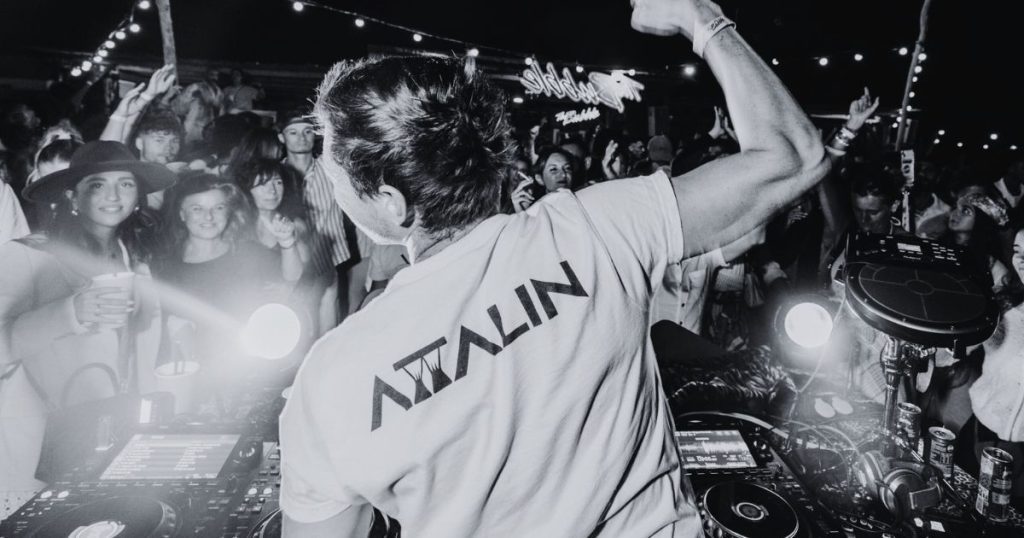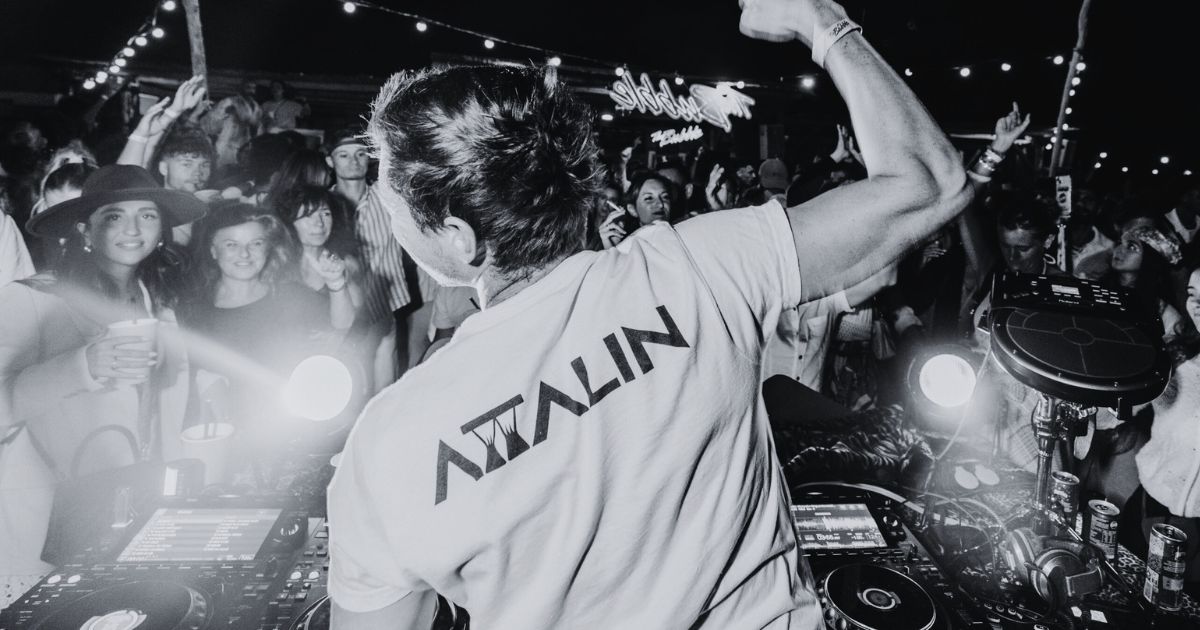

ATTALIN
Tell us more about yourself and your music career: I am a French doctor, djembe player, and percussionist. Everything I do—whether for my patients in the hospital or for my music listeners—centers around managing emotions and vibrations. Everything is vibration: emotions, feelings, and music.
Tell us more about your release: The inspiration for “Soko Soko” struck me one day while walking, with the rhythm of my footsteps guiding my thoughts. I envisioned holding a large piece of wood, striking the ground to emphasize the offbeats. I began by crafting djembe patterns, followed by the melody, and ultimately, the voice of Nes M Buru graced the song, elevating it to something truly sublime.
What is your connection with Cafe De Anatolia?
“Soko Soko” is beginning its journey around the globe, making its way into Spotify editorial playlists and the Cafe De Anatolia playlists, thanks to the powerful aura of the label.
What initially sparked your passion for music, and how did you decide to pursue a career in the industry?
I started making music at a young age, using monitors to record my mixes on audio cassettes while waiting for hours for songs to play on the radio. At 16, I unexpectedly stepped into DJing at my parents’ wedding anniversary, where people danced like never before. Since that day, I have never stepped away from the decks. My focus shifted towards electronic music during my medical internship in Burkina Faso, where the percussion and djembe elements took off. I began composing music at the age of 25.
Can you share a memorable moment from your music career that made a significant impact on your artistic journey?
One of the most magical moments was when I performed “Soko Soko” during the Olympic flame’s journey through France, atop a historic monument. It was truly an unforgettable experience.
As an artist, how do you approach the creative process? Do you have specific rituals or methods to get into the creative mindset?
I experience auditory intuitions, where rhythms and melodies come to me spontaneously. I sing and record these ideas, then bring them into Ableton to layer in my djembe rhythms afterward.
What do you believe sets your music apart from others in the industry? What makes your sound unique?
My style lies at the intersection of Afro house and melodic techno, with a heavy focus on percussion. I’m the only DJ in the world who combines three CDJs with one electronic live djembe, one acoustic djembe, and a looper that records my djembe rhythms, allowing me to play live over the tracks.
How do you handle challenges or setbacks in your music career? Is there a particular experience that taught you valuable lessons?
Winning the DJ POSITIV festival competition and performing at the ancient Theatre of Orange, one of the world’s greatest historical monuments, under the gaze of the statue of Emperor Augustus was a high point for me. Following that, there was a lull with no events, which allowed me to focus on music production. During that time, I released two tracks from the studio, one of which was “Soko Soko.”
Collaboration is a crucial aspect of the music world. Have you collaborated with other artists, and if so, how has it influenced your musical direction?
I collaborated with Nes M Buru, one of the greatest Afro house singers in the world, who added a brilliant dimension to “Soko Soko.”
With technology constantly evolving, how do you leverage digital platforms and social media to connect with your fans and promote your music?
I focus on staying active on Instagram and Spotify, which are central to the electronic music network. I create exclusive content and strive to keep my true feelings, vibes, and emotions intact, avoiding imitation of other DJs and producers.
What’s your favorite part of being a musician? Is there a specific aspect of your career that brings you the most joy and fulfillment?
Two aspects bring me great joy: feeling chills and tears in my eyes while composing music at home, and sharing emotions during my sets, particularly in intimate settings where I can connect closely with the audience.
Could you share your thoughts on the role of live performances in connecting with your audience and building a dedicated fan base?
I believe that a DJ who plays percussion and expresses emotions—sweating, smiling, and even crying—is far more engaging than one who merely stands behind the decks like a robot.
How do you stay motivated and inspired to continue creating music, especially during times when inspiration might be elusive?
I take time away from music to rest my ears, engaging in sports and working as a doctor. I also participate in retreats abroad that involve shamanic practices with drums.
In your opinion, what is the most significant change the music industry has experienced in recent years, and how have you adapted to it?
The arrival of a new generation of the web, including social media and artificial intelligence, represents the most significant change. I strive to educate myself early to keep pace with these developments.
How would you describe your style of music?
I blend Afro house, melodic house, and organic house, leaning towards a more club-oriented and percussive style.
Where do you find inspiration?
I listen to over 1,000 tracks weekly on Beatport and Spotify, and I particularly enjoy listening to djembe players.
Describe how music is important to society:
Music and health are deeply intertwined through the management of emotions and the vibrations they create. Every child is calmed by their mother’s voice—a vibration. Each piece of music can evoke different vibrations and influence individuals in various ways, depending on their mood, emotions, age, and past traumas. Without music, there are no vibrations to support emotions. Music also fosters significant creativity and freedom for artists.
What is the best time of day for you to create?
I find early afternoon on weekends to be the best time to create, especially after a short nap.
Who are your musical influences?
I draw inspiration from African music, Western music, percussion, disco, funk, gospel, salsa, and Brazilian music.
What is the most difficult thing about being a musician?
The hardest part is the void that follows a release or a major event on big stages, which can lead to a drop in serotonin—a mini-depression. Thankfully, I have strong support and a profession I’m passionate about: medicine.
What has been your biggest career highlight so far?
My highlights include performing at the Positiv Festival at the Théâtre Antique d’Orange with Vitalic, the passage of the Olympic flame, and filming my music video atop the Arc de Triomphe in Montpellier, France.
What are your latest releases?
My latest release is “Soko Soko,” featuring Nes M Buru.
Are you working on something new?
Yes, I’m currently working on four new tracks, one of which is finished, and the music video has already been filmed.
Where and when is your next performance?
I can’t answer that question because it’s a secret.
What’s the best piece of advice another musician ever gave you?
Learn to say no; a “no” is better than a hundred “yeses.”
What’s your process for dealing with performance anxiety?
I channel stress as a boost, similar to an animal preparing to hunt. If I don’t feel stress, I’m not at my best. When anxiety becomes overwhelming, I practice meditation and Wim Hof breathing techniques.
Do you have any advice for aspiring musicians?
Listen to the vibrations and emotions of your body.
Title: Soko Soko
Collaborators: ATTALIN ft. Nes M Buru
Date of Release: 11.10.2024 via CAFE DE ANATOLIA

